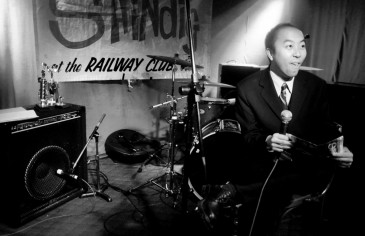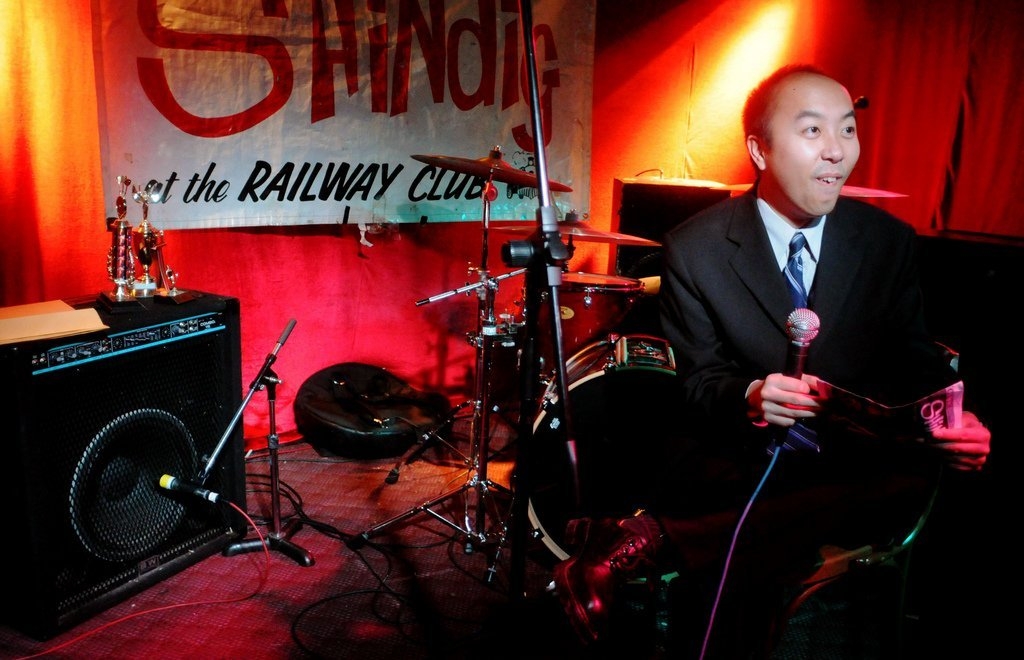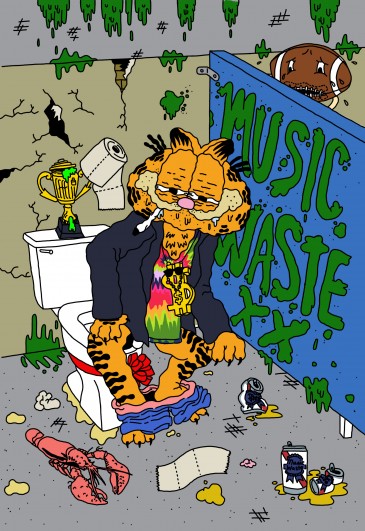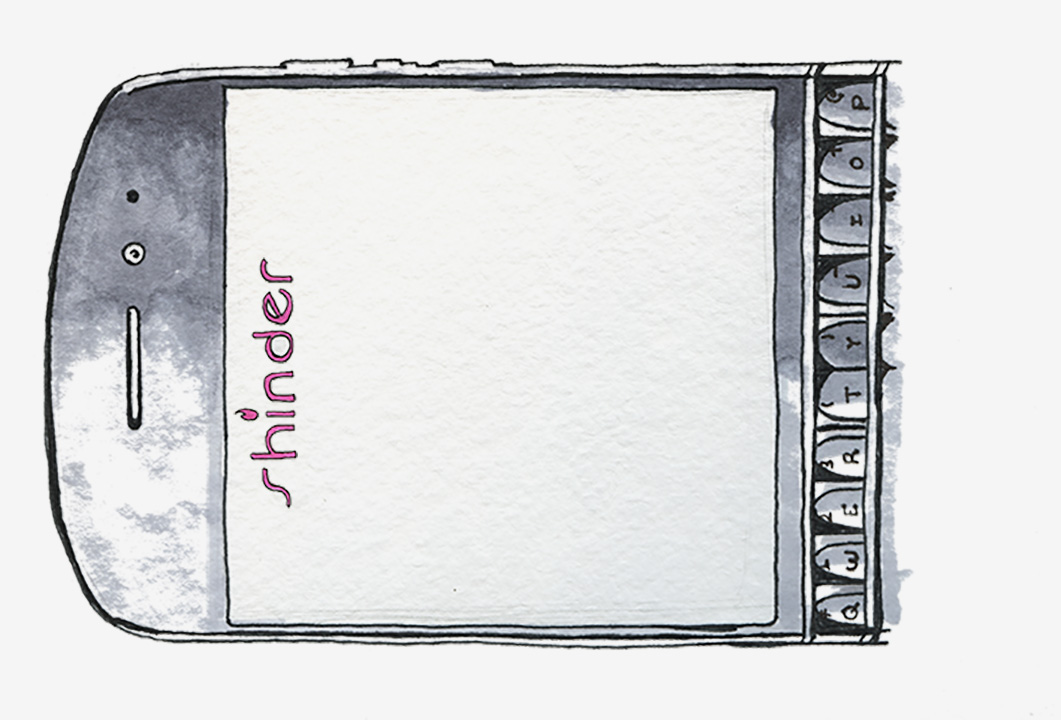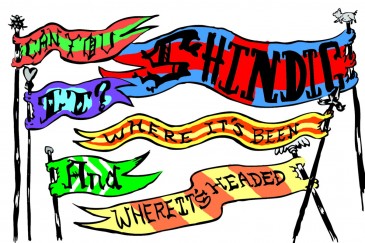
The history of CiTR’s illustrious battle of the bands, Shindig, is shrouded in mystery — appropriate, considering it’s an event that has taken place in dimly-lit rooms, populated by slightly-tipsy patrons, judges and bands for 30 years now. Most everyone who claims involvement at one point in time or another is excited to share memories, but almost all begin with the caveat that they can’t quite remember all of the details. Some are even bold enough to admit that they can’t remember any of the details, but they know they had a good time.
I can include myself in the former category, having organized the event in 1998, 1999, and 2000. Shindig has passed through many capable hands over the course of its wild life, and continues to thrive. Who came up with the idea for a battle of the bands? Good question. Who named it? Well, that’s less of a good question, but at least it’s one I have an answer for.
For a time, CiTR hosted a battle of the bands called “The Hot Air Show” at the Pit Pub on the UBC campus. Fuzzy photos, and memories, still exist to prove this. Gord Badanic is willing to claim ownership of the name change, and had these insights to share: “I started Shindig in the autumn of 1983. I was, I think, the president at that time. Prior to Shindig, the station ran a battle of the bands [the Hot Air Show] at the Pit Pub every Monday night, which the Pit financed and CiTR organized.
Out of the blue, after many successful years of packing the room every Monday night, the Pit cancelled the battle at the end of the 1982-83 school year. We were sad.” According to CiTR alum Chris Dafoe, the Pit’s decision to cancel may have had a little something to do with a band called the Gargoyles, who, in ‘82, “played two songs, dropped trou, and urinated all over the dance floor.”
“CiTR was very reliant on the Hot Air Show,” continues Badanic, “not only for the money, but also the profile on and off campus and the goodwill and outreach it developed for newer bands. I spoke to Janet Forsyth [who ran the Railway Club for 25 years], and suggested a move. She thought it was a great idea, and looked after the advertising. The station vice-president of the time [Dave Ball] was also the main advertising rep for the newly formed Discorder, so we had no difficulty leaning on music-industry type businesses for prizes: recording time at Mushroom Studios was the first prize for that first year. I don’t think very much has changed with Shindig since it began.The timeline, the prizes, format, even Jokes for Beer we set up that first year.”
Badanic’s assertion that not much has changed is eerily correct — while there have been a few small adjustments to the organization of the night, components like Jokes for Beer were hits from the very beginning and form a large part of what keeps patrons coming back year after year.
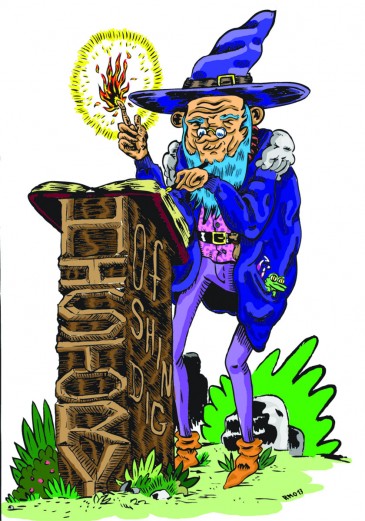
Over the years, Shindig has offered stage time to some of Vancouver’s best bands, only occasionally rewarding them with a victory. According to Bill Mullen, former production manager, Discorder editor, and programming coordinator, two of the best bands to ever come out of Vancouver, Slow and Sons of Freedom, lost. There have been mighty upsets over the years, and there is a rumoured curse that goes with the competition — many participants see winning the event as the kiss of death for a band.
That said, bands like Maow (featuring a young Neko Case on drums) came out victorious, as did the Organ, the Cinch, and Three Inches of Blood. Many young musicians have cut their teeth on the stages at the Savoy and the Railway, and many seasoned musicians have used the competition as, well, an excuse to fuck around.
Badanic, who by the second year of the competition was running the Zulu Records label, released a record of that year’s finalists, including two songs each by Death Sentence, NG3, Nerve Tubes, My 3 Sons, and Rhythm Mission. According to Janis McKenzie, Nerve Tubes, consisting of members of the Odds, had a gimmick where they came on stage in nothing but clear plastic raincoats and, ahem, “strategically-placed instruments.” This record is still to be found in used bins across the Northwest, and is one of the few artifacts of long-forgotten Savoy days.
The Shindig judging process has evolved from having three CiTR members fill out questionnaire-style ballots, where they had to answer questions like “Do you think this band would make good use of studio time?” to the current five-judge free-form style, where judges comment on the bands and the comments are given to the bands at the end of the night. Many bands claim to remember these comments more vividly than the performances themselves, as the judges, a motley assortment of CiTR members, record store employees, journalists, and record label owners, were often more cruel than constructive.
Perhaps that’s what comes of the free drink tickets. Mullen remembers a night in the early ‘80s when, of the three judges present, he was deemed the only one fit to decide on a winner, and his choice made the loser have a minor nervous breakdown — it’s cool, they’re friends now.
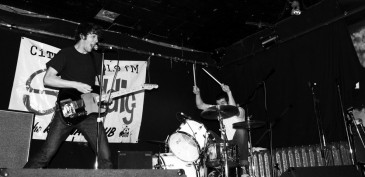
The build-up to announcing a winner was always former host Bryce Dunn’s favourite part of the night: “I had to go through the obligatory thank-yous and talk about the sponsors and judges. I would draw it out so long that I had people throwing drinks at me on more than one occasion and I would sit at people’s tables and ask them about their night and Stan [the old Railway doorman] and I would have conversations about events in the club — all to build the anticipation of announcing the winner.”
The crowds often came as much for the host as for the bands themselves, and I’m pretty sure the hosts kept coming because they loved the crowds. Garnet Harry, another former host, remembers how “Joey Meatrack would sit in the front almost every Monday at the Savoy for a very long time. He was only slightly off his rocker at that time and would swear at me and yell and I would sometimes stop what I was doing and tell the crowd, ‘Ladies and gentlemen, please put your hands together for Joey Meatrack!’ I was always a little disappointed when he wasn’t there.”
There have been many familiar faces come and go over Shindig’s 30 years. I personally miss Stan the doorman immensely. It used to be cool to see Mint Records’ Randy Iwata hiding in the back, scouting the label’s next possible signing. Everyone who has been involved in organizing and running Shindig over the years has done so out of a love for the station and a desire to help foster the Vancouver music community.
“It was a lot of fun,” says Dunn, “and it’s good to see some of those folks who were in bands that played Shindig in the past still playing in bands today and recognizing that Shindig is an integral part of how it shapes (for better or worse) the music community here in Vancouver.”
Shindig has always been a great place to see new bands and to spend time with good people. I slept through many a Wednesday morning class after enjoying my night out at the Railway a tad too much, but seriously, who remembers what classes they took in university anyways? I remember seeing jaw-droppingly fantastic, and terrible, bands and hanging out with my station buddies.
“Sadly,” Harry reminisces, “as we’ve all become older and gotten real jobs outside of radio we see each other much less — if at all. People get married, have kids, move away, get jobs in exotic locales, go to jail, die.” And so, for organizers, judges, and bands alike, Shindig was a very special part of a particular time in their lives. Here’s to another 30 years of the best little battle of the bands in town. And to that one band, that one time, just for the record: don’t ask me again, you’re not getting paid tonight.


